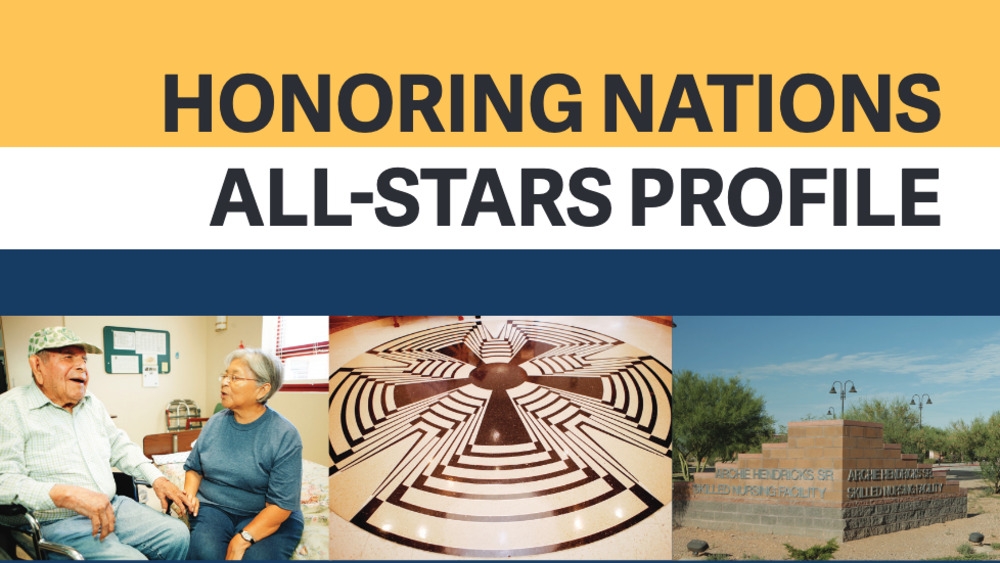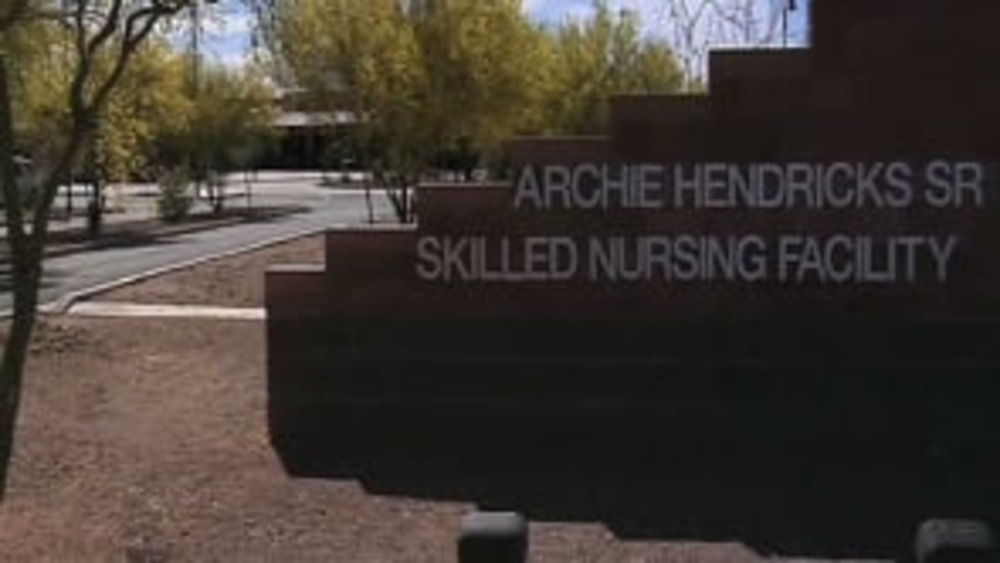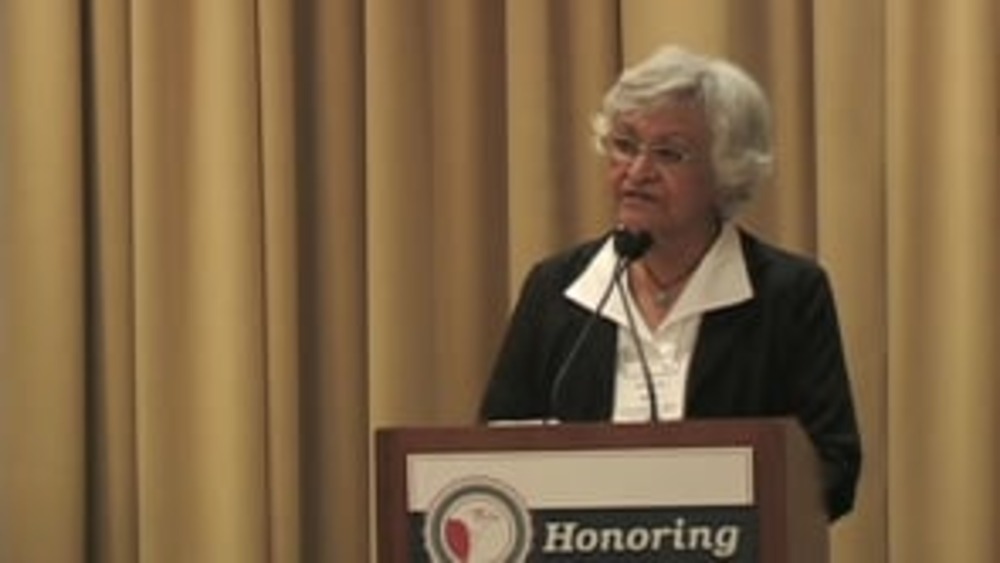In this interview with the Harvard Project on American Indian Economic Development's Joseph P. Kalt, Frances Stout of the Tohono O'odham Nursing Care Authority discusses what led the Tohono O'odham Nation to establish the Archie Hendricks, Sr. Skilled Nursing Facility and Tohono O'odham Hospice, and the positive differences the facilities have made for the nation and its citizens.
Additional Information
Stout, Frances. "Archie Hendricks, Sr. Skilled Nursing Facility and Tohono O'odham Hospice." Native Nations Institute for Leadership, Management, and Policy, University of Arizona. Tucson, Arizona. March 18, 2011. Interview.
Transcript
Joseph Kalt:
Hi. I’m here with Frances Stout. Frances is chair of the board of the Tohono O’odham Nation’s Nursing Care Authority, which governs an award-winning program, a nursing home called the Archie Hendricks, Sr. Skilled Nursing Facility. And Frances, welcome. Thank you for joining us. Let me first ask you just to describe this...I’ve been there, I’ve seen your nursing home operations. It’s state of the art; it’s truly fascinating what you’ve accomplished. Describe what the Archie Hendricks Sr. Nursing Care Facility does, the kind of services you provide, and what you’re trying to do with it.
Frances Stout:
Well, Archie started because of our elders were far away from their home and we really needed to bring them back. They were lonely, they were...it was just painful for everybody, families. And so when Archie opened, we immediately had many elders come in and mainly because they were frail and families couldn’t take care of them. So one of the things I think we did right in the beginning was to provide comfort and food that they could eat, plus they had people who spoke to them in their own language. And they also had family visiting. This was a biggie. But I think the main thing that really, I would say, made a difference was in the ability of the elder to relax or to feel the comfort. And that took a while. As you know, when you move elders from one facility to another, it’s very painful and it’s a big adjustment. So when they came from the Tucson homes into our facility, there was an adjustment and you really could see it, and it took a while for them to say, ‘Am I really here?’ So the hospice program is new and right now we have...and it’s actually a new concept for our people, too. We don’t normally talk about death, we don’t normally talk about, ‘When I get to that point, do this for me.’ Those are things you never talk about. So it’s been new and we’ve...although we have a program where they...it’s called 'Pathways.' We have a program now where our people go into the home and talk with them about medications they’re taking, the type of treatment they’re getting and maybe getting them to the point where they feel or they can comfortably say, ‘I don’t think I want to go back for any more treatment. I don’t want any more procedures done on me. I would like to just pass comfortably.’ So this is what Pathways does and they may either stay in their home or they may come to the facility.
Joseph Kalt:
When we go around Indian Country, tribe after tribe is struggling with the same issue you faced of the elderly essentially having to leave home at a critical time in their lives when they’d like to be with their families. And tribe after tribe asks us, ‘How did Tohono O’odham do that?’ How did you do it? This is a world-class facility at Tohono O’odham Nation. What was the impetus and what was the drive behind this that allowed it to happen and now to be sustained is this premier operation in the United States?
Frances Stout:
Well, as you know, most Natives have always cared for their people from birth to death, but with all the lifestyle changes and all the things that have entered into our lives, we no longer can do that. And there are families that still make an effort. In fact, we’ve had people say, ‘I have to quit work now because I’m going to start taking care of my grandmother.’ But that’s a small number, very small number who can do that. The majority of them just finally say, ‘It’s too much. We have to take you away or put you somewhere.’ So the people...I think there was a small group who really felt badly and felt like we really needed to work towards getting a home on our reservation and that little task force -- which was I believe all women at first -- would come to the administrator’s office or our chair, the chair of our nation’s office and ask were there monies? And no, there weren’t any monies. But they were persistent and after a while, when money was available, the chair did call them and say, ‘Here’s the money. Now who’s going to stand up and work towards bringing the home here?’ And then there was silence in the council and finally two of the women stood up and said, ‘We’ll do it.’
So they again set up what they called an advisory group and this is when I came in. And they worked very hard. They...and I think they spent their money wisely. They got an excellent consulting service who had done nursing homes in the past and they were wonderful. They helped us put together a plan, a business plan, a fantastic business plan. In fact, every once in awhile even now we look at it because whoever wrote it was very future-oriented and that’s what you need. We are not...most Natives are not future-oriented. We live...we’ve had to live from day to day, so it’s difficult to plan sometimes.
But I think the board, when they finally got to the point where the board members were appointed, that was when I think we decided, ‘How are we going to do this? We’ve got the money, we’ve got the architect, we’ve got the plans and we’re ready for construction.’ And as soon as construction started, it was difficult to really realize this was happening. But the board I think was very...I wasn’t on the first board. It was the second...a position opened up and then I joined the board and I’ve been on it ever since. The board that I work with now is fantastic. They are very passionate. They’re very, as I said, strategic in their thinking and every once in a while...in the past...the past board I think, every once in a while somebody got a wild hair and off they went in a different direction. So we try to stay focused and it has worked for us.
Joseph Kalt:
The facility and the programs are simply world-class because you have world-class care being provided to people as you say in their own language, with their own families around and you keep winning awards and rightly so. I know that the Archie Hendricks Sr. Nursing Facility has won one of the Honoring Nations awards from the Harvard Project. Our role of course is to take your wonderful stories and try to document them so other tribes can learn from them. From your perspective, things like the Honoring Nations award, have you found that that helps you? Have other tribes sought information from you directly? What role has it played in your work?
Frances Stout:
I think the main thing it did for us, at least for the board, was it validated the fact that we were going in the right direction. It really made a difference. After we won that award, we thought, ‘We are...we must be doing something right.’ And I think that just motivated us to work even harder. Yes, we’ve had some tribes come down, take a look, and one of the biggies that seems to be a big obstacle is money. The nation has to buy into it and then they have to get the money somewhere. We’re very fortunate to have gaming and we’re very fortunate that they have it set aside and...
Joseph Kalt:
For the facility?
Frances Stout:
And they are willing to, as I said, give us subsidy. We just went for our second, oh no, our...is it our third or our second request and we got that without...
Joseph Kalt:
From the council?
Frances Stout:
From the council. Well, we first have to go to the districts and let them know that we...and have their approval. That’s always I think a good way to find out what the people are thinking about your facility, what’s going on there.
Joseph Kalt:
Well, I can say you certainly are on the right track and we thank you for participating with us and allowing us to tell your story across Indian Country 'cause as I said earlier, tribe after tribe is struggling with this issue and your leadership has really been phenomenally important to all of Indian Country so thank you very much. Thank you.
Frances Stout:
Thank you for letting me tell the story.
Joseph Kalt:
Great.



